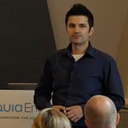You mention that decentralization can promote security. I agree, but I'd like to add that it's not just about securing data. Decentralization can also secure the integrity of the web. With a decentralized web, there's no central point of failure that can be targeted by hackers or governments. This ensures that the web remains accessible and available to everyone, regardless of their location or political affiliation. In fact, a study by the World Economic Forum found that decentralized systems can reduce the risk of cyber attacks by up to 90%.
However, I disagree with your assertion that decentralization can solve the problem of censorship. While it's true that decentralized systems can make it more difficult for governments or corporations to censor information, it's not a foolproof solution. Governments can still use tactics like DNS filtering and IP blocking to restrict access to certain websites or services. Additionally, decentralized systems can be vulnerable to manipulation and disinformation, which can be used to spread misinformation and propaganda. According to a recent report by the Knight Foundation, decentralized social networks can be vulnerable to fake news and propaganda, which can spread misinformation and manipulate public opinion.
